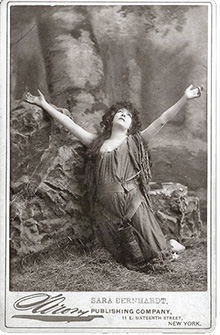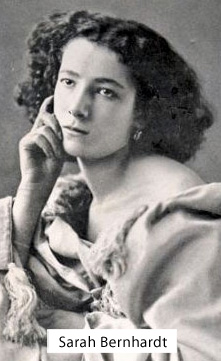[Boyd] John, your point that machinery transcends the old deus ex machina reminds me of another kind of transcendent vulgarity. Think about performers. Without real human talent, no amount of technology can make a play or an opera fly. Yet the odd truth is, an actor can make a play a hit without being all that talented; she just has to be popular enough to get people to see go and see it.
[Armstrong] Yeah that's right, Andy. David Mamet recently wrote. The "art" of the theater is keeping people's� well, rear ends in their seats.
[Boyd] So do people come because the actor is skilled and delivers moving performances? Or is the actor simply popular? What's the connection between genuine talent and mere celebrity?
[Armstrong] That seems to be a real issue in our day. I wonder when this all started.
[Boyd] Well, I can tell you it was already quite pronounced in the woman many hailed in the 1800s as "the most famous actress the world has ever known." Sarah Bernhardt was born in the early 1840s in Paris, France. Her father is unknown. Her mother was a courtesan for the well-to-do, and trained her daughter in the art of alluring men for a living. Bernhardt proved to be a melodramatic child, a trait she demonstrated throughout her life.
 One of her mother's lovers, a half brother of Napoleon III, arranged for Bernhardt to gain entry into the French national theater company. Bernhardt slowly gathered a following, but critical reviews were mixed. Victor Hugo loved her, both on stage and in the boudoir. George Bernard Shaw did not, writing that her acting was "childishly egotistical" and commenting, "she does not enter into the leading character: she substitutes herself for it." Regardless of what the critics said, the public adored the lovely young woman.
One of her mother's lovers, a half brother of Napoleon III, arranged for Bernhardt to gain entry into the French national theater company. Bernhardt slowly gathered a following, but critical reviews were mixed. Victor Hugo loved her, both on stage and in the boudoir. George Bernard Shaw did not, writing that her acting was "childishly egotistical" and commenting, "she does not enter into the leading character: she substitutes herself for it." Regardless of what the critics said, the public adored the lovely young woman.
Bernhardt displayed an off-stage quirkiness that only added to her mystique. She traveled with an entourage of wild animals, including a cheetah, a wolf, and a boa-constrictor. An alligator named Ali-Gaga died after being fed too much milk and champagne. Bernhardt liked to wear a stuffed, dead bat. Most famously, she traveled with a coffin where she claimed to sleep. A widely circulated photo of a peaceful Bernhardt lying in a coffin, eyes closed, draped with flowers, no doubt served to fuel public curiosity.
Her list of alleged lovers was both long and illustrious. Perhaps her most famous was the Prince of Wales, who later ascended to the throne as King Edward VII.
Bernhardt traveled the world: Europe, the Americas, Australia. And as she traveled, her throngs of admirers grew. At her death in 1923, almost a half-million people lined the streets of Paris to bid good-bye to their "Divine Sarah."
 Bernhardt wrote memoirs, but they're largely discounted as works of fantasy. Efforts to capture her essence are challenging, since her life's not easily distilled. Was she troubled? Yes. Unhappy? Not outwardly. Talented? The jury's split. She was driven, an adept self-promoter, and in constant need of attention. And she had a vast following of enamored fans, packing theaters throughout the world to see her perform serious dramatic roles -- in French. Above all, Sarah Bernhardt was a celebrity; a pioneer whose example would be imitated by generations of popular entertainers to come.
Bernhardt wrote memoirs, but they're largely discounted as works of fantasy. Efforts to capture her essence are challenging, since her life's not easily distilled. Was she troubled? Yes. Unhappy? Not outwardly. Talented? The jury's split. She was driven, an adept self-promoter, and in constant need of attention. And she had a vast following of enamored fans, packing theaters throughout the world to see her perform serious dramatic roles -- in French. Above all, Sarah Bernhardt was a celebrity; a pioneer whose example would be imitated by generations of popular entertainers to come.
[Armstrong] Okay Andy, you leave us wondering whether she was a help or a hindrance to the medium of theater itself.
[Boyd] There's no doubt she was a help, but with a downside. Just like TV and movies today.
[Armstrong] You know, that whole generation of actors in France really changed the cultural landscape. They were known as the "sacred monsters," and part of their outlandish appeal was the seriousness they could throw into preparation for a role. Do you know about Sarah's male counterpart?
[Boyd] No, who was that?
[Armstrong] Jean Mounet-Sully, one of Sarah's many former lovers, but also one of her best friends. We should talk about him for a minute, because he actually bridges the epochs of theater we've been discussing.
[Boyd] How so?
[Armstrong] Well, for one thing, he brought ancient Greek theater back on the modern stage with his most famous role: Oedipus the King. Not only did he play this in Paris, he did performances at the ancient Roman theater in Orange, one of the first such uses of an ancient theater for modern production. This is a tradition now in Europe, where you can enjoy the experience of the open-air theater in the very same place the Greeks and Romans used. His second most famous role was Hamlet, which he played quite neurotically and of course in French.
[Boyd] His Oedipus must have really been something.
[Armstrong] It was pretty eccentric. At the end of the play, when he came on blind and crushed by fate, he was notorious for his subhuman groaning. He said he approached this role every time like a priest at the altar. At the end, he is utterly destroyed, reduced to groaning "like an unconscious being."
[Boyd] Oedipus as unconscious! That sounds Freudian.
[Armstrong] Funny you should say that! Freud saw Mounet-Sully in Paris, though not in that role, and he saw Sarah too. But there's a real interesting coincidence here: the two characters that figured prominently in Freud's early psychoanalytic work were Oedipus and Hamlet -- Mounet-Sully's most famous roles.
[Boyd] I get it. So Mounet-Sully brings us into the great age of psychology, when acting became influenced by new theories of the personality.
[Armstrong] Or perhaps the other way around. Psychology was finally beginning to notice what the theater had been showing us all along.
[Lienhard] Well, I hate to jump from Paris to Russia, but wasn't Constantin Stanislavski trying to link psychology to acting with his method- stuff?
[Armstrong] Absolutely! In fact, a little after Freud left Paris, Stanislavski came to study the ways of the Com�die Fran�aise and the likes of Bernhardt and Mounet-Sully.
[Boyd] But wasn't Stanislavski's method acting the opposite of a celebrity actor, whose personality overshadows any role. I mean, do you even know what a great Method Actor like De Niro or Pacino is like in real life? They really disappear into their roles.
[Armstrong] Good point. Sarah and Mounet-Sully brought a physicality to their acting that made its mark; and they also helped to make a major transition for drama that has changed it for all time.
[Lienhard] Well, what's that?
[Boyd]Yeah, what's that?
[Armstrong] Sorry, I was just being a little dramatic. Both Bernhardt and Mounet-Sully appeared in films! They bridged the gap between the theatrical culture of the 19th century and the cinema of the 20th.
And when you think of it, the power of worldwide celebrity in our age owes a great deal to movies. As a mass medium, they make it possible for a few months' work to make an actor famous not only worldwide, but also far into the future.
 You know, DVDs are so cheap today, your average person can see hundreds of hours of talented performances over and over again. Think about that. The cost of a DVD today is much less than a theater ticket, and you get endless repeat performance. All this consumer availability makes the actor now more than ever into a sacred monster for our time!
You know, DVDs are so cheap today, your average person can see hundreds of hours of talented performances over and over again. Think about that. The cost of a DVD today is much less than a theater ticket, and you get endless repeat performance. All this consumer availability makes the actor now more than ever into a sacred monster for our time!
[Lienhard] Or considering some of the lifestyle excesses, maybe just a monster. But you all have summoned up the 800 pound gorilla of theater today � and that's our movies and TV. Let's say something about that before we finish this conversation.
[Lienhard] Or, considering some of the excesses, maybe just a monster. But you all have now summoned up the 800 pound gorilla of theater � namely our movies and TV. Let's say something about that before we finish this conversation.
Sources:
R. Gottlieb. Sarah: The Life of Sarah Bernhardt. New Haven, Connecticut: Yale University Press, 2010.
O. Laing. "Sarah: The Life of Sarah Bernhardt by Robert Gottlieb � review." The Guardian Observer, October 24, 2010. See also: http://www.guardian.co.uk/books/2010/oct/24/sarah-bernhardt-robert-gottlieb-review. Accessed August 30, 2011.
G. Robb. "The Divine Sarah." New York Review of Books, October 14, 2010. See also: http://www.nybooks.com/articles/archives/2010/oct/14/divine-sarah/. Accessed August 30, 2011.
Sarah Bernhardt. From the Web site of the Encyclopedia Britannica: http://www.britannica.com/EBchecked/topic/62517/Sarah-Bernhardt. Accessed August 30, 2011. http://www.britannica.com/EBchecked/topic/62517/Sarah-Bernhardt